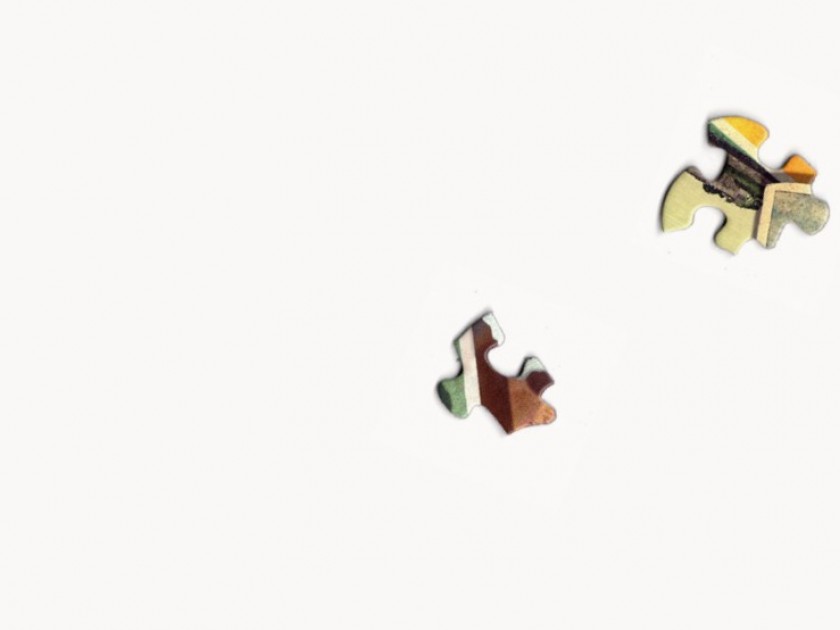
Image by Katherine Messenger
At the protest where everyone was outraged
about children in cages a guy who looked
vaguely like Jesus was holding a Keep Families
Together sign and a woman who wanted to speak
was holding a megaphone then said I’ve never
used one of these things how does it work? and her
friend with the #lovethyneighbor (no exceptions)
sign said hold it closer to your mouth and she did
and while she was speaking pickups drove by with
enormous Trump flags — pickups drove by blasting
aggressive country God Bless the USA and I couldn’t
stop looking at protest Jesus’s work boots, his cut-off
homemade tank top. I was holding a sign sharpied
on the back of a pizza box from four protests ago
that said Child of a Refugee with a red arrow pointing
to me and I stood near three women with small cages
for rabbits / birds / gerbils that each held dolls
—one was a Cabbage Patch Kid with blonde braids—
since protest as mixed media sculpture is a thing now
even in Appalachia and there was a toddler wearing
a superman shirt, holding a rainbow Superman Was
a Refugee poster and his father was holding him
on his shoulders. Some nights when it was late
and my sons were small and asleep in their beds
I’d turn off all the lights in the house and suddenly
the sound of a train or a cow or cricket something
moving and alive from their puzzles would speak
when you shifted a piece off or put one back on—
this inanimate thing made animate by light would
utter ghost sounds. The reporter from the local paper
asked me why I was there on the sidewalk, so I told
her about my mother and the DP camps — I told her
only a small part of the story but she still looked
shocked. To hold is to bear the weight of a person
or thing, to grasp or carry or support with our arms,
to embrace someone, to keep or detain someone;
there’s the hold of a ship, or remaining secure and
intact in a position, to maintain a connection until
the person on the phone line is free to speak, to
have in your possession the act of grasping some-
thing, a degree of power or control. The last Shoah
survivors are nearly gone so they’ve made holograms
to tell their stories to school children and museum
visitors but it’s not the same; we respond to the sound
of an actual human voice attached to a body which
means when the next woman with the megaphone
in an ecumenical collar starts to read the last four
lines of Emma Lazarus’s “The New Colossus”
there’s not a dry eye on the sidewalk in front of
our local congressional office — the congressman
who is gone, the congressman who got teary, who
looked me in the eye and said that kind of
persecution could only happen in Germany when I
told him my family story, refugee from fugio:
to flee or escape from this to that. Our meeting
was a season before Nazis marched through
Charlottesville and the rabbis pulled the Torah
scrolls from the building and someone was killed
and I began quizzing my sons on our full
names/addresses/phone numbers. Superman
—born Kal-El on the planet Krypton — was
rocketed to earth by his father unaccompanied,
alone as an infant moments before the destruction
of his planet; it was months before anger
turned to panic then to fear and here we are
the dislodged pieces, shoulder to shoulder,
light-sensitive and bleating into the deep night.
Erika Meitner is the author of five books of poems, including Ideal Cities (Harper Perennial, 2010), which was a 2009 National Poetry Series winner, Copia (BOA Editions, 2014), and Holy Moly Carry Me (BOA Editions, 2018). Her poems have appeared in The New York Times Magazine, Tin House, The New Republic, Virginia Quarterly Review, Oxford American, Best American Poetry, Ploughshares, and elsewhere. In 2015, she was the US-UK Fulbright Distinguished Scholar in Creative Writing at the Seamus Heaney Centre for Poetry at Queen’s University Belfast, and she has also received fellowships from The MacDowell Colony, the Virginia Center for Creative Arts, the Blue Mountain Center, and the Wisconsin Institute for Creative Writing. She is currently an associate professor of English at Virginia Tech, where she directs the MFA and undergraduate programs in Creative Writing.